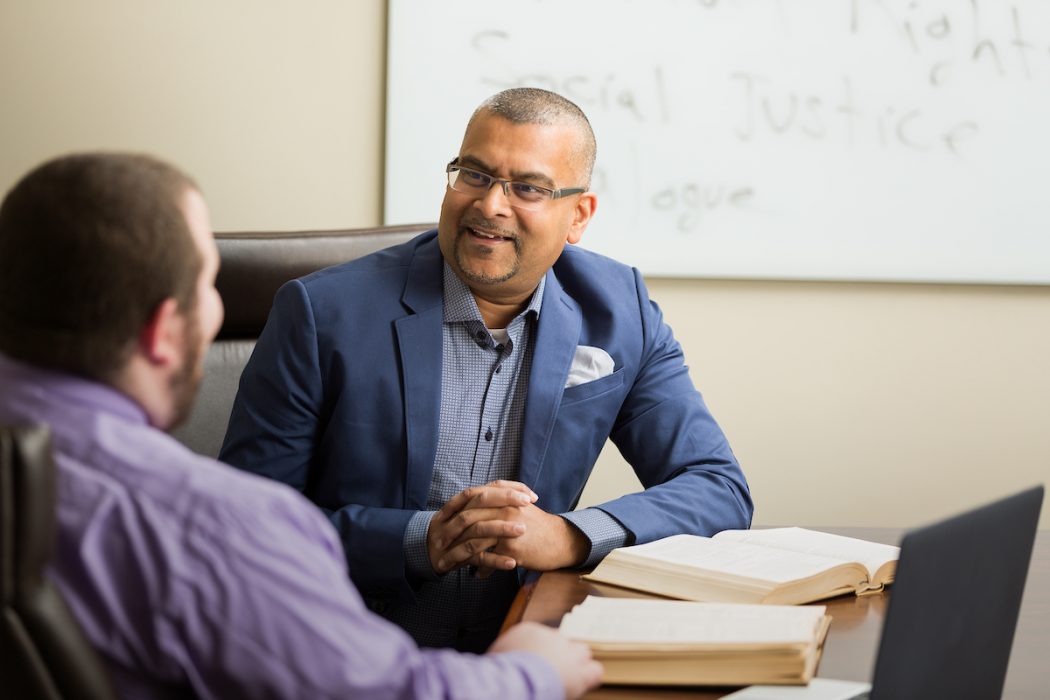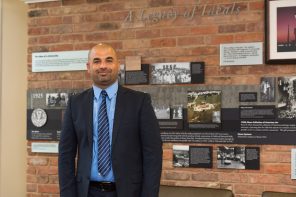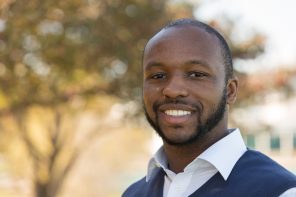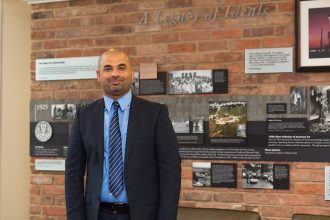“Even as a kid I had this thing about social justice,” Kutty said. “There was an arrest warrant issued for my dad. Indira Gandhi was the Prime Minister and she had passed emergency laws to suppress her political dissidents. We went house-to-house and eventually escaped to Canada,” Kutty said. He was instructed not to tell anybody where his dad was and where they were going. “Because of this experience this theme has been present throughout my life and I became focused on human rights.”
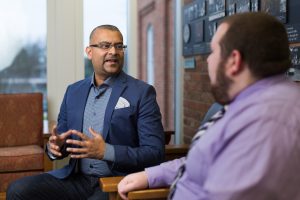
Associate Professor and Director of the LL.M. Program, Faisal Kutty with current 3L student Christopher Wartman
Kutty’s father had been editor of a religious publication and was studying on a scholarship in Canada. The arrest warrant was issued in absentia while he was away. “He came back to get us,” Kutty said. “Thousands of people, including my uncle, were arrested and detained.” They were later released when the laws that the Prime Minister enacted were overthrown by the Supreme Court.
Kutty’s human rights issues were not over. As a child growing up in Canada in the 1980s he was “different” and felt left out in a white world. “There was a lot of racism in those days, and I was bullied and called a ‘Paki,’ a derogatory name. I became shy and withdrawn,” Kutty said.
It was an experience that not only served to fuel Kutty’s defense of human rights, but one that ignited his passion for teaching. “Teachers have had a lot of influence on me,” Kutty said. “I was a very bad student. I never did my homework and I didn’t believe in myself. I failed 5th grade and was going to be streamed into trade school. Many people put me down. I remember some teachers and others making me feel as if I would not amount to anything.”
Kutty’s 8th grade teacher then changed the course of his life. “My teacher knew my father was a Ph.D. student and he was aware of my immigrant background,” Kutty said. “He forced me to move from the back of the classroom to the front row. On nearly every assignment he would say, ‘Faisal, go put up the answer.’”
At one point that year, that same teacher asked the class what they wanted to be when they were older. “I said I wanted to be a teacher just to make him feel good, but deep down I felt I wasn’t smart enough,” Kutty said. “My teacher said, ‘That’s wonderful! I think you’d be an amazing teacher.’ The fact that he believed in me so much changed me.”
By the time Kutty started ninth grade his grades soared and he earned a university scholarship. A Canadian citizen and married father of two girls, Kutty now divides his time between teaching and directing the International LL.M. Program at Valparaiso University Law School and teaching as an adjunct professor at Osgoode Hall Law School, York University, Canada. He sees himself as a ‘Can-American, Muslim, lawyer, law professor, and activist.’ The activist bug bit Kutty in college. It was at York University that he became president of the Muslim Students Association.
I went to law school to fight for justice, and make a difference in society.
After completing law school, Kutty started the Canadian Muslim Civil Liberties Association and co-founded the Canadian Council on American/Islamic Relations, now called the National Council on Canadian Muslims. He later established a law firm in Canada, growing it to eight lawyers. After the practice became successful he was able to pursue human rights work, civil rights work and community advocacy.
“When I started my law firm, people would come to me with all kinds of issues,” Kutty said. “Then 9-11 happened. There were huge changes in terms of Muslims facing discrimination. National security laws were being changed and there was increased targeting of the Muslim community. My practice then took on a life of its own.”
Kutty’s human rights articles and commentary are frequently published worldwide in media outlets such as The Toronto Star, The Huffington Post, and Al Jazeera International, among others. He was approached by the Huffington Post to write a regular blog column, and currently writes twice a month for The Express Tribune, a leading Pakistani daily. Named one of the “500 Most Influential Muslims in the World” for seven consecutive years since 2010 by the Royal Islamic Strategic Studies Centre in Jordan, Kutty also earned the Valparaiso University Alumni Association’s Distinguished Teaching Award in 2015 and was recently presented with an Award of Excellence for his outstanding contribution to the promotion of Human Rights and Justice at the 2016 Council of Agencies Serving South Asians (CASSA) Awards in Toronto.
Kutty said he frequently gets requests regarding human rights issues on social media because people fear losing their jobs if they address these sensitive topics themselves. “People fear being viewed as extremists,” he said. “Discrimination comes from ignorance. People are afraid of different things. What I realized over time is that laws are necessary but they can only do so much. More important is education and to have people engage with one another. At the end of the day most people are very similar.”
I write about human rights issues because I’m in a position to do it and I feel it is a personal obligation. People should cherish the rights they have here and we need to make sure those rights are protected.

